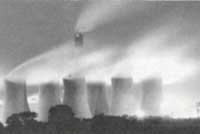Right to know
 FROm next year, us power plants will be forced to test the coal they burn for traces of mercury. The us Environmental Protection Agency (EPA) will also require a selected number of plants to test their emissions for the heavy metal. This will help EPA decide whether mercury emissions should be regulated and to inform the public of the scale of the problem. The initiative, which will affect 1,400 coal-fired power plants in the us, is part of the Clinton administration's 'right-to-know' public disclosure policy on potential environmental hazards. The EPA will begin gathering the data from January 1, 1999, and will post the results on the Internet by early 2000. The EPA plans to cut mercury emissions by 50 per cent by 2006. The EPA reported to us Congress last year that utility companies are the largest source of airborne mercury emissions in the country. Mercury emissions often accumulate in rivers and lakes and can cause health hazard through the food chain. Exposure to the chemical can also damage nerves.
FROm next year, us power plants will be forced to test the coal they burn for traces of mercury. The us Environmental Protection Agency (EPA) will also require a selected number of plants to test their emissions for the heavy metal. This will help EPA decide whether mercury emissions should be regulated and to inform the public of the scale of the problem. The initiative, which will affect 1,400 coal-fired power plants in the us, is part of the Clinton administration's 'right-to-know' public disclosure policy on potential environmental hazards. The EPA will begin gathering the data from January 1, 1999, and will post the results on the Internet by early 2000. The EPA plans to cut mercury emissions by 50 per cent by 2006. The EPA reported to us Congress last year that utility companies are the largest source of airborne mercury emissions in the country. Mercury emissions often accumulate in rivers and lakes and can cause health hazard through the food chain. Exposure to the chemical can also damage nerves.
Related Content
- Water in Crisis/es: 2020 Water, Sanitation and Hygiene Barometer
- A landscape for everyone: integrating rights-based and landscape governance approaches
- Order of the Supreme Court of India regarding a number of legislations discriminatory to leprosy affected persons, 05/07/2018
- Making the law count: ten environment justice stories by community paralegals in India
- Wind power units fail to find outlets, crisis situation brewing; what you should know
- Thirsting for justice: transparency and poor people’s struggle for clean water in Indonesia, Mongolia, and Thailand
